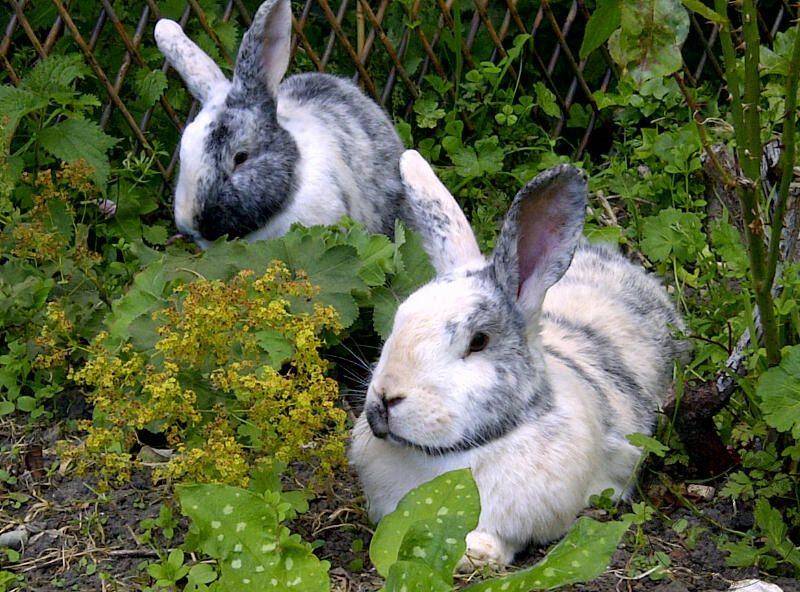Losing a much-loved pet bunny at any age can be a distressing experience. Losing one whilst it is still young is not only upsetting but also very frustrating, as there is often no apparent reason to explain what went wrong. Premature death in rabbits is sadly quite common. Although it is impossible to quantify the actual numbers involved (few people admit that their pet has died unexpectedly), few appear to live their entire lifespan of seven years or more.
I first became aware of the extent of the problem when contacted by rabbit owners asking for advice about what to do about their pet bunnies that had just lost their partners. As a result of frequent requests for help with lonely bunnies, I started a bunny “dating agency,” and now almost a quarter of all our rabbits adopted from CottonTails are re-homed as “match-ups” every year. This prompted me to carry out a small study of 100 case histories (supplied by owners of bereaved rabbits) to work out why so many rabbits die young and what, if anything, could be done to prevent at least some of these deaths from occurring in the future.
The causes of premature death in pet rabbits fall into many categories, as seen above. Almost a quarter (23%) of the cases studied were either put to sleep or died due to teeth-associated problems. This mirrors the high incidence of teeth problems (malocclusion and jaw abscesses) seen in the rabbits coming into CottonTails, which makes up 20% of our annual intake.
Over 17% of the rabbits studied died from digestive upset such as mucoid enteritis or diarrhoea. However, if one could do follow-up visits for all rabbits bought from pet shops, garden centres and other sources, I strongly suspect that this figure would be much higher, with many baby rabbits dying within days of purchase from this condition.
10% showed symptoms such as head tilt and other central nervous system problems. The diagnosis was unclear, but possible candidates were E. cuniculi (a parasite) or inner ear infection caused by Pasteurella, a widespread bacterial infection in rabbits.
The remaining 50% were divided between the following:
- 8% unknown cause after short illness;
- 7% killed by a fox;
- 7% respiratory infection;
- 6% cancer;
- 6% sudden death with no symptoms (perhaps VHD?);
- 3% died under anaesthetic;
- 3% shock from fireworks;
- 2% kidney failure;
- 2% myxomatosis;
- 2% flystrike;
- 1% poisoned;
- 1% heat exhaustion;
- 1% accidental injury;
- 1% escaped and assumed dead.
It is clear from these results that teeth problems and digestive upsets are the two major killers of rabbits that die prematurely. Little can be done to prevent the largely inherited malocclusion problem (tooth overgrowth/misalignment) except to ensure that the pet shop or breeder supplying the rabbit is knowledgeable about the problem and can assure you that their stock is free from the disease.
Feeding an appropriate amount of a vet-recommended food and providing good quality hay ad lib can also help minimise the problem, but will not cure it or prevent it from occurring. Regular vet visits can manage dental disease, but this is expensive and often distressing for the rabbit and owner alike, and the outcome may not be positive.
Regarding digestive upsets, the commonest killer of rabbits under 12 weeks of age is mucoid enteritis or associated digestive conditions like bloat and gut stasis. This topic is covered in an article on this website, so I won’t repeat the details here, but suffice it to say this is a severe condition, especially for young rabbits. There is no guarantee of success with the treatment of mucoid enteritis and related conditions, and often, by the time the rabbit is seen to be affected, it is too late to save it, although a small percentage survive with supportive veterinary care.
A sudden change of diet or a diet low in fibre may contribute, but there are other possible factors. If the diet is changed, it must be done gradually over a week or two. It is often best not to feed fresh vegetables or grass to rabbits under 12 weeks unless they have been fed on it, as their digestive systems are very delicate at this age. It takes very little to initiate a chain of events leading to death within hours. Although it is more common in young rabbits, mucoid enteritis can also occur in adult rabbits, especially in late pregnancy or during lactation, and is thought to be caused by hypocalcaemia.
Severe diarrhoea in rabbits can also be caused by bacterial infections and coccidiosis (a parasite), poor hygiene and/or overcrowding being contributing factors. Prevention is the only line of defence when dealing with digestive problems in rabbits.
Other causes of premature death in rabbits appear to be many and varied. Some are unavoidable, but most can be attributed to owner ignorance. A general apathy by the rabbit-owning public towards vaccinating and neutering must have some bearing on this tragic waste of life. Whilst most people still look at rabbits and other small animals as disposable commodities, there is little hope of attitudes changing for the better. However, here are some tips to try to avoid your pet rabbit from becoming a premature death statistic:
- Find out as much as you can about your pet’s needs before you bring it home.
- Buy from a reputable source that is knowledgeable about issues such as teeth and temperament.
- Avoid “starter kits” and buy the correct equipment. Rabbits should be housed in a large hutch with a run attached permanently, preferably not double-level, as the ramps can be dangerous.
- Find out what the rabbit has previously been fed on so you can change the diet gradually. Remember that rabbits only need a tiny amount of dried food, typically one flat egg cup per rabbit per day, plus green vegetables that the rabbit will tolerate. Fresh meadow hay should comprise 70-80% of a rabbit’s diet.
- Once you have found a food that suits your rabbit, stick to it. Do not feed treats or coloured vegetables, as they are high in sugar.
- Find a source of fresh meadow hay and feed ad-lib.
- Be very cautious about introducing fresh vegetables and grass, especially to rabbits under 12 weeks of age.
- Neuter and vaccinate your rabbit. The combined myxomatosis and VHD vaccine should be given annually.
- Consider pet insurance to help with unexpected vet bills.
For further information about rabbit welfare issues, contact CottonTails® Rabbit and Guinea Pig Rescue (registered charity 1078850) via the “Contact Us” page using the email form provided. You will also find lots of beneficial information in the Rabbit Care article elsewhere on the website.

